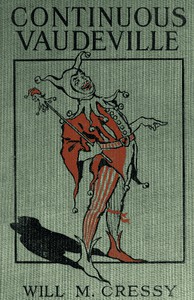Continuous Vaudeville by Will M. Cressy (best thriller novels to read txt) 📖

- Author: Will M. Cressy
Book online «Continuous Vaudeville by Will M. Cressy (best thriller novels to read txt) 📖». Author Will M. Cressy
When we had reached our rooms that night my wife turned on me and said sharply,
"What did you do that for?"
"What did I do what for?"
"What did you tell him that story for?"
"Well, why in thunder shouldn't I tell it to him? What's the matter with that story anyway?"
She looked at me curiously for a moment, then said,
"Don't you know what you did?"
"No."
"Why that was the same story he had just told you."
[157]
E. J. Connelly has got a summer home at Lake Sunapee, New Hampshire. He also owns several building lots around there. As building lots without buildings on them do not bring in much cash, Edward was seriously contemplating building some cottages on the lots, furnishing and renting them. I met him one evening this fall and asked him how the cottages were coming on.
"It's all off," he said; "nothing doing in the cottage line for me."
I asked him what had happened to change his mind so suddenly.
"Well, Bill," he said, "you know I am not a chap who goes hunting for trouble; I'm nervous; I don't like to be troubled with other people's troubles. This afternoon I was over to Bob Eaton's, and you know he has got some cottages up at the other end of the lake that he rents, furnished."
"Yes, I knew that."
"Well," continued Connelly, "while I was over to Bob's this afternoon a man who has rented one of these cottages came down there. He had left his cottage and driven twelve miles down to Bob's house to make a kick; and what do you suppose the kick was?"
[158]"Haven't the least idea."
"There wasn't any nutmeg grater in the cottage. Twelve miles to make a five-cent kick. And my cottages would be only two hundred feet away. No landlord business for your Uncle Edward. No, sir."
[159]
THE TROUBLES OF THE LAUGH GETTERSIt is a solemn business, this getting laughs for a living. Supposing the people don't laugh. Then how are you going to live? Take an act that you have been doing for weeks. Every afternoon and every night the audience laughs at exactly the same lines; this goes on night after night, week after week and city after city. Then you go into some city like Toronto or St. Paul and Hamlet's soliloquy would get as many laughs as you do. Now what are you going to do? Other players on the bill are getting laughs right along and you, in the language of the stage, are "dying standing up."
I have had the same experiences off the stage. I once tried to tell an old German gentleman in St. Louis a story that had been highly recommended to me as being funny. It was about a man going up to a St. Louis policeman and asking him the quickest way to get to the Mt. Olive[160] hospital. The policeman told him to go over to Grogan's saloon and call the bartender an A. P. A.
Then I waited for the laugh. And immediately I knew I had a Toronto audience. The old man studied a moment, then said,
"Why did he not tell him to take an Olive Street car?"
An old lady from Brooklyn was visiting us. I told her one of Lew Dockstader's stories. How he had a girl over in Brooklyn. Her father was an undertaker. And Lew could always tell how business was with the old man by the looks of the table. If he had had a good job lately there would be flowers on the table, and ice on the butter.
I waited for the laugh. "But the giggle that he longed for never came." The old lady looked up with a look of interest and said,
"Did he say what their name was? Perhaps we knew them."
I met a banker in Toronto. I tried to tell him a story referring to the banking business, hoping against hope that I might get one laugh in that city. I told him about a colored man who went[161] into a colored bank down South and wanted to draw out his deposit of twenty dollars that had been in there for eight years. And the colored cashier told him he did not have any money in there. That the interest had eaten it up long ago.
"Yes," said the banking gentleman, with a pitying smile, "very clever. But he was wrong, you know; interest adds to your principal, not detracts."
 Playing Hoboken.
Playing Hoboken.
William Cahill was playing Hoboken. Hoboken is entirely Dutch. William is entirely Irish. Result, William, on his opening show, did not get a laugh or a hand. After his act was[162] over he stood around, dazed, for a few minutes; then he made his way over to the "peek hole," looked out and sized up the audience carefully, then turned away, muttering to himself,
"This is a h—— of a place for an Irishman."
 Carrying "The Old Man" With Her.
Carrying "The Old Man" With Her.
Mr. and Mrs. Harry Foy carried a nurse-maid for their little girl. When I came in to the theater I would always go in and speak to the nurse-maid and the baby. Then after I was made up I would come in again and visit them. But the maid never knew that I was the same fellow; and[163] along the last of the week she began to wonder what ever became of that old chap she saw around the stage during the show, but never afterwards. So she went over to Miss Dayne and said,
"Say, do you carry that old man with you or do you get a new one in every town?"
"Well," said Clarence Drown, manager of the Los Angeles Orpheum, "she is one of those women you are always glad to learn is the wife of some man you don't like."
Freddie Niblo, Jr., sat on the floor in their New York home one day, thinking it over. Finally he looked up at his mother (Josephine Cohan) and said,
"Say, Mama, wouldn't it be nice if you had a regular husband instead of an actor husband? Then perhaps he would be at home sometimes."
A well known Booking Agency had just transferred one of the stenographers from the New York office to the Chicago office. On her first morning in the new office she came over to the manager and said,
[164]"I suppose you start the day the same here as they do in the New York office?"
"Why—er—yes—I suppose so," said the manager.
"Well, kiss me then, and let me get to work."
[165]
ASLEEP WITH HER SWITCHA certain young lady (and Abe Jacobs says he knows she was a lady because she told him so, adding the information that any one who said she wasn't was a —— —— liar) was appearing at the Majestic Theater in Chicago not so very long ago. Owing to conditions over which she, apparently, had no control, the exact hours of her appearance were a little uncertain. Her first entrance was rather a dramatic affair. One of the other characters, hearing a noise behind a certain door, would draw a revolver, aim it at the door, and say—
"Come out! Come out, or I will shoot!"
Upon this occasion everything ran smoothly—up to this point; the gentleman had drawn his revolver and ordered her to appear.
"Come out!" he said; "come out or I will shoot!"
But there was nothing doing; so he repeated,
[166]"Come out or I will shoot!"
And still nothing doing; so for a third time he called,
"If you don't come out I will shoot!"
There was a pause, then, as the curtain started to descend, a disgusted voice came from the stage manager's box,
"Go on and shoot; she's down in her dressing room asleep."
A crowd was sitting around the Vaudeville Comedy Club, and the conversation had drifted around to a discussion of the old-time Vaudeville and that of the present day.
"Well, I can tell you one thing," said James Dolan, of Dolan & Lenhar, "there didn't use to be all these divorces and separations among the old-timers. We didn't use to think that we had to have a new wife every year or two; we stuck to the old ones; the ones that had helped us get our starts. Look at Mr. and Mrs. Mark Murphy; Mr. and Mrs. Tom Nawn; Ryan & Richfield; Cressy and Dayne; Dolan & Lenhar; Filson & Errol. I tell you, boys, we stuck in those days."
"Yes, but here; wait a minute," spoke up Hor[167]ace Wright; "give us youngsters a chance. I haven't been married but three years, but I am sticking as fast as I can. Give me time, and I'll get into your class—sometime."
[168]
I JOIN THE SUFFRAGETTESI am now a suffragette. I don't exactly understand what it is all about yet, but when I was up in New Hampshire a few weeks ago I met a very enthusiastic lady who started in to convert me to "the cause." Finally, after she had talked fourteen minutes without breathing once, I got a chance to speak.
"But wait a minute," I said; "you are wasting time. As I understand this thing, what you want is equal rights—for the sexes; is that correct?"
She said that was it exactly.
"All right then," I said, "I am with you, heart and soul; and, although I haven't known it, I have been with you for a long time. I am willing to fight shoulder to shoulder with you for this glorious cause, for if there is anything that will get a man equal rights with a woman I am for it."
"But," she said, "you vote, don't you?"
"No," I said, "I can't! Martin Beck won't let me off to go home."
[169]"But," she continued, "you can sit on juries, and we can't."
"Well, good Lord," I exclaimed, "you don't want to sit on juries, do you?"
"We want to do everything that men do."
"Well, I don't know," I replied; "it doesn't look good to me; women on a jury."
"Why not?"
"Well, supposing there should be some big case on, and there were six women and six men on the jury, and the jury should be locked up in the jury room all night. You know darn well the verdict would be 'Guilty.'"
If I had an automobile that was in the last stages of decomposition and I couldn't sell it to anybody else I think I should try to sell it to the chap that painted that automobile on the drop curtain in the Garrick Theater in Chicago.
On this drop curtain there is painted an electric runabout. The chap that painted it knew a good deal more about painting than he did about automobiles. There isn't the slightest symptom of any steering gear on it; the front axle is a straight iron rod without a sign of any joint in it.
One of the passengers is either sitting exactly[170] on the top of the steering bar, or else there isn't any; and with all four wheels set rigidly so it can't turn, the car is just leaving the roadway and plunging into a flower bed.
There is one theater in Chicago that is going to have an awful time enforcing that "no tipping allowed" rule. The Illinois Theater has a stage manager by the name of Frank Tipping.
My wife says that all the Mormons are not in Utah: only their wives are not on.
Jim Morton says Duluth is a nice little "Street in One."
Fred Wyckoff says the two worst weeks in show business are Holy Week and Milwaukee.
"Tommie" Ryan has got the right idea. He has had himself appointed as a special police officer over at his home in Hohokus, N. J. (Think of any one's having a bright idea in a town with a name like that.) Now when he gets lonesome he runs his automobile up Main Street at full speed (13 miles an hour), arrests himself for[171] overspeeding, collects two dollars for making the arrest, then fails to appear against himself and the case is dismissed.
There is no disputing the fact that education is





Comments (0)